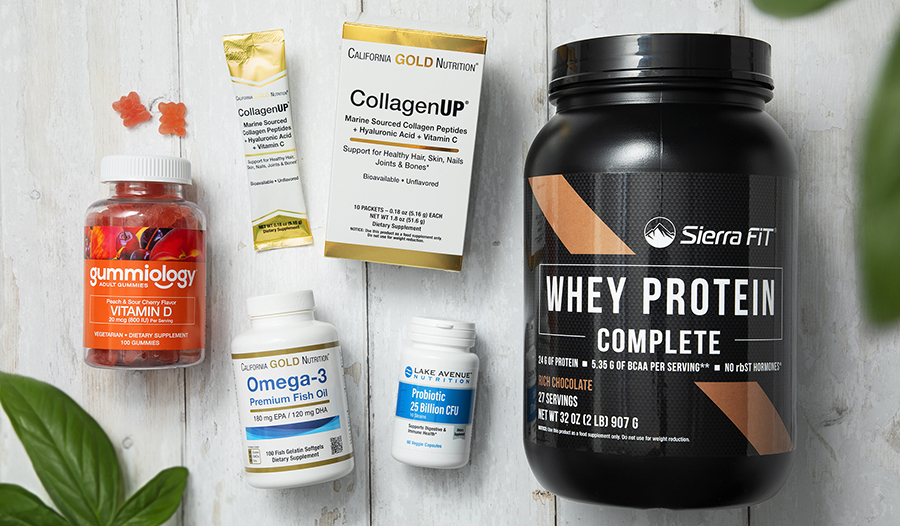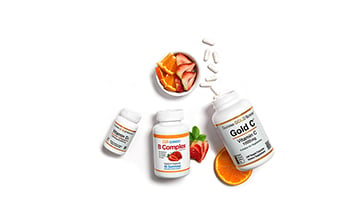Best of Health & Wellness 2021: 5 Supplements You Should Know
DISCLAIMER:This blog does not intend to provide diagnosis...
- In this article:
- 1. Probiotics
- 2. Collagen
- 3. Whey Protein
- 4. Omega-3 Fish Oil
- 5. Vitamin D

2021 was a year unlike any other for many around the world. Billions were affected by the challenges of the global pandemic, which has disrupted lives, economies, and our usual way of life. For some, seeing the devastating effects of the virus inspired a focus on their own physical and mental health — many have committed to improving their wellness to make themselves more resistant to potential health threats that may come their way.
The top five supplements of 2021 listed below demonstrate that people everywhere attend to their gut health, immune support, muscle optimization, and reducing bodily inflammation more than ever, along with a focus on the heart, brain, joints, and skin.
1. Probiotics
Who would have predicted that “eating bacteria” would become one of the most popular health trends of 2021? While that may sound strange, the fact is that probiotics are supplements that contain beneficial bacteria, which play an integral role in overall human health. The health benefits of probiotics have been well known since the early 19th century when children with diarrhea were deficient in bifidobacteria. These days, probiotics are commonly taken by those with chronic digestive issues, such as irritable bowel syndrome, constipation, or diarrhea. However, they may also help with other conditions, including those associated with mental health and hormone imbalances.
Scientists tell us that 70 percent of the immune system is found in the gut. The intestines are where our immune system identifies and targets dangerous pathogens which threaten our bodies. A good presence of beneficial microbes enhances our health and wellness while supporting immunity.
According to a 2019 study, probiotics have also been shown to help reduce symptoms of both depression and anxiety. The fact that 2021 saw many people afflicted with these ailments explains the popularity of probiotics.
A 2019 study evaluated the combination of probiotics and vitamin D in 60 women with the common condition known as PCOS, or polycystic ovarian syndrome. At the end of the 12 weeks, researchers found that supplementing with probiotics and vitamin D had a synergistic effect, with notable improvements in mental health, hormone balance, and less unwanted hair growth.
Lastly, a 2020 study showed that probiotics may be protective in pregnant women and may help prevent gestational diabetes, a temporary form of diabetes developed during pregnancy.
Probiotics are available in capsule and gummy formulations.
2. Collagen
As we age, our skin becomes weaker. My patients aged 60 and older will ask me about their thinning skin and visible skin injuries daily. Sometimes, mild trauma can result in a tear or significant bruise. Many people take collagen to promote skin health because it aids skin elasticity and hydration while reducing wrinkles. Does the evidence support this assertion?
In 2018, researchers conducted a double-blind, placebo-controlled trial on 64 patients. Half were given collagen, while the other half revived a placebo. The subjects were followed for six to 12 weeks, and at both periods, researchers noted that skin hydration had improved. By 12 weeks, there was a significant visual reduction in wrinkles and improved skin elasticity. A 2019 study found similar results and no safety issues associated with taking collagen.
A 2020 study of 39 patients over 65 years of age evaluated the use of collagen and its effects. The subjects were assessed for eight weeks total. By the end of the sixth week, it was noted that skin elasticity and skin thickness had improved. As a result, the researchers concluded, “Oral nutrition supplements containing collagen peptides may reduce skin vulnerability in older adults and thus prevent conditions such as skin tears.”
Collagen is available as a powder or capsule formulation appropriate for all adults.
3. Whey Protein
Whey protein powder is consumed for various reasons. Some take it to help build muscle mass and strength, while others rely on it as a meal replacement to trim down or control blood sugar. Whatever your reason, whey protein is a valuable food item that you can always have on the ready in your kitchen cabinet. Research suggests it can have many benefits.
A 2017 study showed that those with diabetes who consumed a whey protein drink for breakfast as a meal replacement saw an improvement in their hemoglobin A1C, a blood test marker for diabetes control. They also lost unwanted pounds.
A different study published the same year showed that whey protein and its components can be helpful. The researchers also concluded that “…protein quantity and quality are important for improving energy balance.” They found that whey protein reduced body fat, a common goal for many.
A 2018 study reinforced the benefits of taking whey protein to assist with muscle recovery after working out. This is a common reason it is consumed by athletes and those who lift weights regularly.
Whey protein may also have advantages for older individuals. Another study in 2018 found that senior citizens with low muscle mass who took whey protein supplementation had an improvement in the speed at which they walked. In addition, whey protein helped these seniors meet their daily protein requirements safely and effectively.
4. Omega-3 Fish Oil
Many people try to avoid fat in their diets. However, it’s essential to understand that good fats and bad fats exist. Omega-3 fish oil, an essential fatty acid, is one of those good fats and is believed to have numerous health benefits. For those who are vegan, flaxseed is an acceptable alternative.
A deficiency of essential fatty acids in the blood is quite common. A 2021 study showed that in the United States, for example, 95 percent of children and 68 percent of adults had blood levels below the recommended dietary guidelines. A healthy diet rich in fish, nuts (almonds, brazil nuts, etc.), and seeds (chia, pumpkin, etc.) can help improve these levels. When these are not sufficiently consumed, supplements can be helpful.
Over the last few years, researchers have found that omega-3 fish oils have a beneficial effect on the gut microbiome and brain. As mentioned above, the intestines are where 70 percent of our immune system is, so maintaining a diverse gut microbiome is a key to wellness. A 2019 study showed that omega-3 fatty acids in the intestines specifically help improve intestinal wall integrity. This way helps prevent what many doctors refer to as a “leaky gut.”
A 2020 meta-analysis of randomized controlled trials showed that patients hospitalized with sepsis, a blood infection, were 18 percent less likely to die when supplemented with omega-3 fatty acids than those who were not given the essential fatty acid. Further, those with sepsis and gastrointestinal dysfunction were 50 percent less likely to die. More studies need to be done regarding this.
Fish oil is available in capsule or liquid formulations, such as cod liver oil.
5. Vitamin D
In 2007, I started testing patients for a vitamin D deficiency. During this time, I was one of a handful of doctors doing so. I was even more so in the minority in Southern California, a Mediterranean climate where the average temperature is around 70 degrees with more than 330 days of sunshine per year.
The common belief was that a deficiency in the sunshine vitamin was unlikely in a place where grey skies are so rare. During my first year of testing, I only conducted about 20 blood tests. I was surprised to learn almost 90 percent of those tested were deficient. By my second year, I had worked on hundreds of tests; the results were the same. If my California patients were deficient in vitamin D, I wondered about the rest of the world. More and more doctors who tested their patients found similar results.
Doctors were well aware of rickets, a severe vitamin D deficiency resulting in bone malformation in childhood. However, since rickets was rarely encountered, vitamin D deficiency was also assumed to be rare. This thinking has changed as studies on vitamin D have significantly increased in recent years. In many, low vitamin D blood levels have been associated with numerous health conditions such as thin bones, muscle aches, elevated blood pressure, heart disease, stroke, cancers, diabetes, increased risk for influenza and other viral infections, and many other chronic conditions.
Recently, a 2020 meta-analysis study evaluated 45 studies, including more than 73,000 patients. The researchers assessed whether vitamin D could help protect against viral respiratory infections and concluded that vitamin D was safe and protected against acute upper respiratory infections.
Vitamin D is available in capsule and liquid formulations.
References:
- Wieërs G, Belkhir L, Enaud R, Leclercq S, Philippart de Foy JM, Dequenne I, de Timary P, Cani PD. How Probiotics Affect the Microbiota. Front Cell Infect Microbiology. 2020 Jan 15;9:454.
- Liu RT, Walsh RFL, Sheehan AE. Prebiotics and probiotics for depression and anxiety: A Systematic review and meta-analysis of controlled clinical trials. Neurosci Biobehav Rev. 2019 Jul;102:13-23.
- Ostadmohammadi V, Jamilian M, Bahmani F, Asemi Z. Vitamin D and probiotic co-supplementation affects mental health, hormonal, inflammatory and oxidative stress parameters in women with polycystic ovary syndrome. J Ovarian Res. 2019 Jan 21;12(1):5.
- Homayouni A, Bagheri N, Mohammad-Alizadeh-Charandabi S, Kashani N, Mobaraki-Asl N, Mirghafurvand M, Asgharian H, Ansari F, Pourjafar H. Prevention of Gestational Diabetes Mellitus (GDM) and Probiotics: Mechanism of Action: A Review. Curr Diabetes Rev. 2020;16(6):538-545.
- Kim DU, Chung HC, Choi J, Sakai Y, Lee BY. Oral Intake of Low-Molecular-Weight Collagen Peptide Improves Hydration, Elasticity, and Wrinkling in Human Skin: A Randomized, Double-Blind, Placebo-Controlled Study. Nutrients. 2018 Jun 26;10(7):826.
- Choi FD, Sung CT, Juhasz ML, Mesinkovsk NA. Oral Collagen Supplementation: A Systematic Review of Dermatological Applications. J Drugs Dermatol. 2019 Jan 1;18(1):9-16
- Jakubowicz D, Wainstein J, Landau Z, Ahren B, Barnea M, Bar-Dayan Y, Froy O. High-energy breakfast based on whey protein reduces body weight, postprandial glycemia and HbA 1C in Type 2 diabetes. J Nutr Biochem. 2017 Nov;49:1-7.
- Zapata RC, Singh A, Pezeshki A, Nibber T, Chelikani PK. Whey Protein Components - Lactalbumin and Lactoferrin - Improve Energy Balance and Metabolism. Sci Rep. 2017 Aug 30;7(1):9917.
- Davies RW, Carson BP, Jakeman PM. The Effect of Whey Protein Supplementation on the Temporal Recovery of Muscle Function Following Resistance Training: A Systematic Review and Meta-Analysis. Nutrients. 2018 Feb 16;10(2):221.
- Lin CC, Shih MH, Chen CD, Yeh SL. Effects of adequate dietary protein with whey protein, leucine, and vitamin D supplementation on sarcopenia in older adults: An open-label, parallel-group study. Clin Nutr. 2021 Mar;40(3):1323-1329.
- Murphy RA, Devarshi PP, Ekimura S, Marshall K, Hazels Mitmesser S. Long-chain omega-3 fatty acid serum concentrations across life stages in the USA: an analysis of NHANES 2011-2012. BMJ Open. 2021;11(5):e043301. Published 2021 May 10.
- Costantini L, Molinari R, Farinon B, Merendino N. Impact of Omega-3 Fatty Acids on the Gut Microbiota. Int J Mol Sci. 2017;18(12):2645. Published 2017 Dec 7.
- Parolini C. Effects of Fish n-3 PUFAs on Intestinal Microbiota and Immune System. Mar Drugs. 2019 Jun 22;17(6):374.
- Wang C, Han D, Feng X, Wu J. Omega-3 fatty acid supplementation is associated with favorable outcomes in patients with sepsis: an updated meta-analysis. J Int Med Res. 2020;48(12)
- Jolliffe DA, Camargo CA Jr, Sluyter JD, Aglipay M, Aloia JF, et. al. Vitamin D supplementation to prevent acute respiratory infections: systematic review and meta-analysis of aggregate data from randomised controlled trials. medRxiv [Preprint]. 2020 Nov 25:2020

 By Dr. Eric Madrid, M.D.
By Dr. Eric Madrid, M.D.


